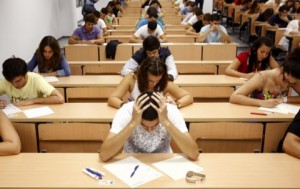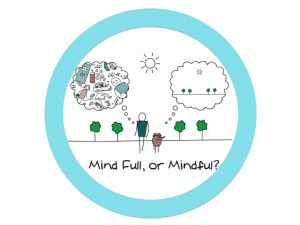Thursday, April 7th, 2016...9:36 pm
Dealing with Exam Stress for T.A.s
This week, OISE had their conference for graduating students to present their research. As a first year Masters student, I had the opportunity to sit on some thesis presentations on mindfulness, and I was blown away about how applicable the educational research meant for elementary to high school students was to undergrad students at U of T.
As graduate students, a lot of us are also teaching assistants, which means that we’re administering exams for undergrad students. This also means that we’re going to be dealing with a lot of students who experience stress, and test anxiety. Now, we all expect a certain amount of stress and anxiety in university, but when that stress and anxiety starts to affect academic performance, and creates undue emotional trauma for students, then it becomes a problem. But how can we help undergrad students deal with these negative feelings that might severely interrupt their educational and personal growth?
Some of the graduate students I heard from addressed ways that teachers can help students deal with this anxiety and stress, which I’ll share with you here in the hopes that we can help create a more supportive learning environment at U of T:
- Teacher Commitment – the number one factor in reducing student anxiety and bringing mindfulness into the classroom is teacher commitment; if you can show your students that you’re dedicated to their wellbeing and success, you might be surprised at the quality of their response. We also need to remember that part of teacher commitment is being non-judgemental; in order for students to step out of their comfort zone, and maybe ask for help and support, teachers need to be non-judgemental.
- Differentiated Instruction – remember, all students learn differently. A lot of people focus on differentiated instruction in the elementary and senior grades, but we can’t forget that graduating from high school doesn’t magically make the way we learn go away, nor does attending university suddenly dictate that we all become uniform thinkers. To this end, it’s important for us to remember, as educators (because every T.A. IS an educator), that our students are depending on us to help them succeed to the best of their If you don’t know what differentiated instruction is, or have no clue what I’m talking about when I say that everyone learns differently, check out the links below for more info and surveys you can use to find out the different ways in which your students learn. You might just learn a thing or two about yourself as well.
Multiple Intelligence Quizzes:
http://www.bgfl.org/bgfl/custom/resources_ftp/client_ftp/ks3/ict/multiple_int/questions/questions.cfm (with audio version)
http://www.edutopia.org/multiple-intelligences-assessment
Info on Multiple Intelligences and Differentiated Instruction:
http://www.mypersonality.info/multiple-intelligences/ (brief overview)
http://www.businessballs.com/howardgardnermultipleintelligences.htm (in-depth explanations if this tickles your curiosity bone)
http://printables.scholastic.com/shop/prcontent/Multiple-Intellgence-Questionnaire/9780439590204-001 (printable)
http://www.readingrockets.org/article/what-differentiated-instruction
- Mindfulness – help your students with deep breathing, and self-reflection techniques (click here for more info). If you don’t feel prepared to offer this type of advice to your students, then direct them to one of the many on-campus mindfulness events to help them find calm during stressful times. Also check out the book “Full Catastrophe Living” by John Kabat-Zinn. Studies show that mindfulness can help with: mental health, self-regulation, academic performance, student enthusiasm, and classroom management.
Now, most of these benefits pertain to studies done elementary through grade 12, but university students are still students, which leads me to think that if we can apply this same teacher commitment, mindfulness, empathy, and differentiated instruction for the multiple intelligences of the students we’re T.A.s for, then we can help reduce the anxiety of undergraduate students, cultivate better learning habits for our own selves, and create a more supportive and successful academic learning environment for the students at U of T.



Leave a Reply